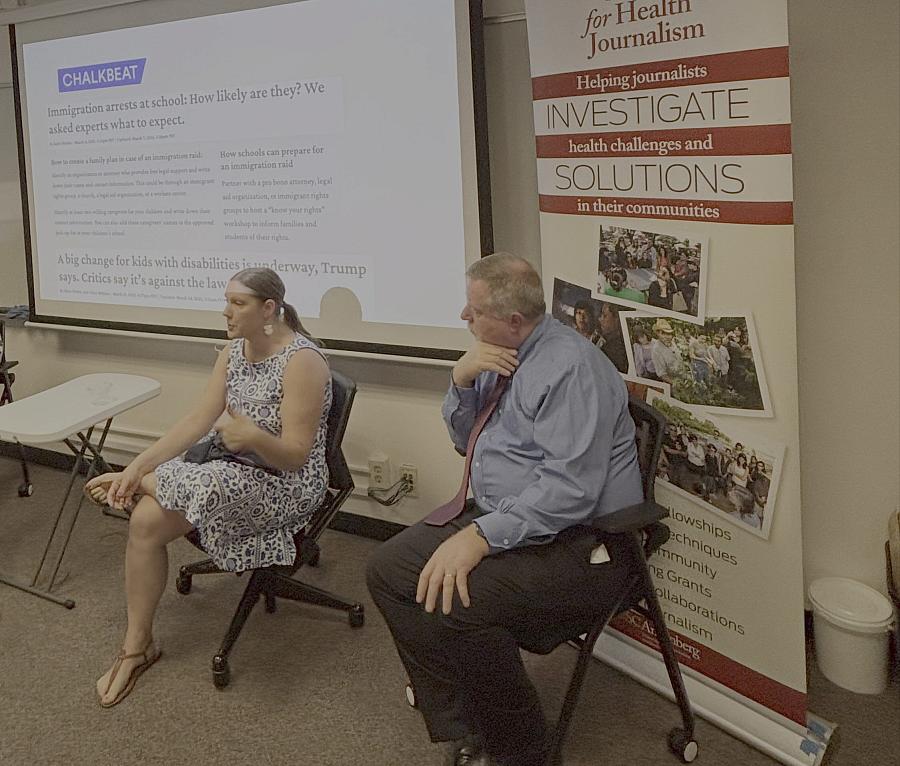The ‘unprecedented divestment’ in children at the federal level deserves more coverage

(Photo by Allen J. Schaben/Los Angeles Times via Getty Images)
The kids are not all right, and children’s advocates fear things are only going to get worse.
The U.S. already ranks near the bottom on dozens of measures of childhood well-being, investing much less in kids than other wealthy nations, said Bruce Lesley, president of the advocacy group First Focus on Children. Now children are facing “unprecedented divestment” under the Trump administration, the longtime advocate warns.
“We have never seen anything like this,” Lesley told reporters participating in the Center for Health Journalism’s 2025 National Fellowship.
Federal efforts that boosted spending on early childhood and child nutrition amid the COVID-19 pandemic have since ended, triggering a major drop-off in government spending on kids.
Lesley also pointed to a host of new threats to children and their wellbeing: Federal plans to slash the Department of Education and other programs. Immigration crackdowns that separate parents from children. Attacks on care for transgender youth and programs related to “DEI.” And then there’s the budget bill, H.R. 1, which will trigger over $1 trillion in cuts to key programs like Medicaid and food stamps.
Lesley said that when one official in the Trump administration, Office of Management and Budget director Russ Vought, argued that the U.S. should get back to the original purpose of Medicaid, “what he talked about was the aged, blind and disabled.”
“Note that what he left out there was kids,” Lesley said.
For Chalkbeat national reporter Kalyn Belsha, who writes about K-12 education and other topics, the barrage of news about federal cutbacks has forced her to make difficult choices about what to cover as a member of a tiny team charged with reporting on education across the country. Belsha has tried to zero in on topics where families are fearful or confused, as well as issues where schools will be forced to take action in response to federal decisions.

Chalkbeat national reporter Kalyn Belsha joined Bruce Lesley, president of the advocacy group First Focus on Children, to talk about the latest threats to children's health and well-being at the 2025 National Fellowship in Los Angeles last month.
“I always kind of have in my mind – what kind of context or background can I add as a reporter to this issue?” Belsha told reporting fellows.
When faced with a story that might seem remote for some readers, such as cuts at the U.S. Department of Education, Belsha broke down what was happening to make it more understandable. She interviewed someone who had been terminated from the department’s Office of English Language Acquisition, who walked through the work the office had been doing to safeguard federal funding for English learners, helping readers understand why it mattered.
“We realized a lot of people have no idea how the Department of Education works – or a lot of the federal government in general – so part of our job was to try to peel off pieces of the story to make them smaller, so that it didn’t feel like this big bureaucracy,” Belsha said.
Belsha, who is based in Chicago, also dug into how federal policies had played out in the past to help readers understand the likely effects of new rules under the Trump administration. For example, she explored how immigration raids on Mississippi poultry plants in 2019 had stranded children who came home to find that their parents had disappeared. Many schools in the area had no policies for how to handle such an event, forcing communities to improvise: In one instance, a CrossFit gym opened its doors and served pizza to sobbing children, Belsha recounted.
Readers have sometimes questioned how Chalkbeat can predict the likely effects of Trump administration policies: Belsha said looking backwards can be helpful because with this kind of reporting, “we’ve been able to point to something that’s already happened.”
Belsha also cautioned reporters to convey urgency without overstating the risk for families. That could mean clarifying whether a policy change is imminent, for instance, or whether it requires Congressional action. Her news outlet has also sought to prepare and empower families by breaking down information into FAQs and offering guides such as “how to make a family plan” or “how to make a school plan” to prepare for workplace raids.
Lesley urged reporters to highlight the effects of policy changes on children in their stories, “because when they’re left out of the conversation and are not visible, then the focus is on adults.” That in turn shapes perceptions of whether cuts or changes are warranted, because children are widely seen by Americans as being “deserving” of public assistance, he said.
For instance, Medicaid “work requirements definitely target the deservingness of parents and adults,” who are seen as less deserving, he said. “Yet kids are collateral damage.”
To speak to children, Belsha told reporters that she often interviews one of their parents first, which gives families a better sense of what questions may be asked. She also prepares carefully for interviews with youth, knowing that her phrasing may affect how a child responds.
When she spoke to a child affected by the workplace raids at the Mississippi poultry plants, Belsha didn’t immediately ask a child about her mother’s arrest. Instead, she started by asking, “What was it like at school the next day?” and walked back in time from there.
As they spoke, Belsha looked for opportunities to ask the child about times in which she exercised agency and showed resilience, such as when she tried to be brave for her sisters.
“I’ve tried really hard to balance the interview,” she said, “so it’s not totally on trauma.”

